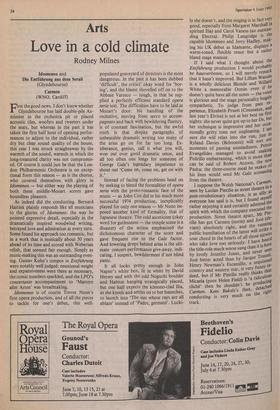Arts
Love in a cold climate
Rodney Milnes
Idomeneo and Die Entfiihrung aus dem Serail (Glyndebourne) Carmen (WNO, Cardiff) Virst the good news. I don't know whether
Glyndebourne has laid double-pile Ax- minster in the orchestra pit or placed acoustic tiles, woofers and tweeters under the seats, but whereas in the past it has taken the first half hour of opening perfor- mances to adjust to the individual, rather dry but clear sound quality of the house, this year I was struck straightaway by the warmth of the sound, warmth in which the long-treasured clarity was not compromis- ed. Of course it could just be that the Lon- don Philharmonic Orchestra is on excep- tional form this season — as is the chorus, who covered themselves with glory in Idomeneo — but either way the playing of both these middle-Mozart scores gave boundless pleasure.
As indeed did the conducting. Bernard Haitink plainly responds like all musicians to the glories of Idomeneo: the way he pointed expressive detail, especially in the dramatically inspired woodwind writing, betrayed love and admiration at every turn. Some found his approach too romantic, but in a work that is musically about 50 years ahead of its time and scored with Weberian relish, that seemed fair enough. Simply as music-making this was an outstanding even- ing. Gustav Kuhn's tempos in Entfuhrung were notably well judged: emotional weight and expansiveness were there as necessary, the comic numbers sparkled, and the LPO's concertante accompaniment to `Martern aller Arten' was breathtaking.
Idomeneo is of course Trevor Nunn's first opera production, and of all the pieces to tackle for one's debut, this well- populated graveyard of directors is the most dangerous. In the past it has been dubbed `difficult', the critics' okay word for 'bor- ing', and the blame shovelled off on to the Abbate Varesco — tough, in that he sup- plied a perfectly efficient standard opera seria text. The difficulties have to be laid at Mozart's door: his handling of the recitative, moving from secco to accom- pagnato and back with bewildering fluency, is of constant fascination, but the awful truth is that despite paragraphs of unbeatable dramatic writing too many of the arias go on for far too long. Ex- uberance, genius, call it what you will, won out over good dramatic sense, and all too often one longs for someone of George Gale's legendary impatience to shout out 'Come on, come on, get on with it.'
Instead of facing the problems head on by seeking to blend the formalities of opera seria with the proto-romantic face of the music — as John Cox did in his much more successful 1974 production, inexplicably played for only one season — Mr Nunn im- posed another kind of formality, that of Japanese theatre. The cold asceticism (okay word for gutlessness — the temple scene is a disaster) of the action emphasised the dichotomous character of the score and gave frequent rise to the Gale factor. And lowering drops behind arias is the ulti- mate concert-performance give-away, indi- cating, I suspect, bewilderment if not blind panic.
It all looks pretty enough in John Napier's white box, lit in white by David Hersey and with the odd Noguchi boulder and Habitat hanging strategically placed, but one half expects the kimono-clad Ilia, as she kneels and settles on to her haunches, to launch into 'The sun whose rays are all ablaze' instead of 'Padre, germani'. Lucki-
ly she doesn't, and the sing
ga tins r 4n Jf ua nc et very3 good, especially from Margaret Marshall (a spirited Ilia) and Carol Vaness (an outstan- ding Electra). Philip
Langridge is the capable Idomeneo and Jerry Hadley, mak- ing his UK debut as Idainante, displays a warm-toned, flexible tenor but a rather bland stage manner. If I said what I thought about the
Entfuhrung production I would probably be hausverboten, so I will merely remark that it hasn't improved. But Lillian Watson is a wholly delicious Blonde and Willard White a memorable Osmin even if he doesn't quite have all the notes — the voice is glorious and the stage personality hugely sympathetic. To judge from past ex- perience, Elizabeth Pruett (Constanze, and last year's Elvira) is not at her best on first nights: she never quite got up to her Ds, but her technique is impressive and her occa- sionally gritty tone not unpleasing• I aril sure she will relax into the run, just as Ryland Davies (Belmonte) will sort out moments of passing unsteadiness. Petros Evangelides managed to avoid making Pedrillo embarrassing, which is more than can be said of Robert Atzorn, the new Pasha: the three-course meal he makes of his the theatre.
Mr Gale screaming
from I suppose the Welsh National's Carmen, seen by Lucian Pintilie as street theatre in a post-revolutionary situation, is as silly as everyone has said it is, but, I found myself rather enjoying it and certainly admired the spirit with which the company executed the production. Street theatre apart, Mr Pin- tilie has got Carmen (norm) and Jose (de- viant) absolutely right, and the running public humiliation of the latter will strike a sour chord in the hearts of all those nitwits . who take love too seriously. I have heara the title-role much worse sung than it is here by lovely Jennifer Jones, and never seer Jose better acted than by Jacque Trusse Henry Newman's Escamillo, a sequinned country and western star, is very funny in- deed, but if Mr Pintilie really thinks that Micaela (poor Helen Field) is 'a ridiculous cliche' then he shouldn't be producing track.
Kees Bakels's fleet, detached conducting is very much on the right
k.














































 Previous page
Previous page